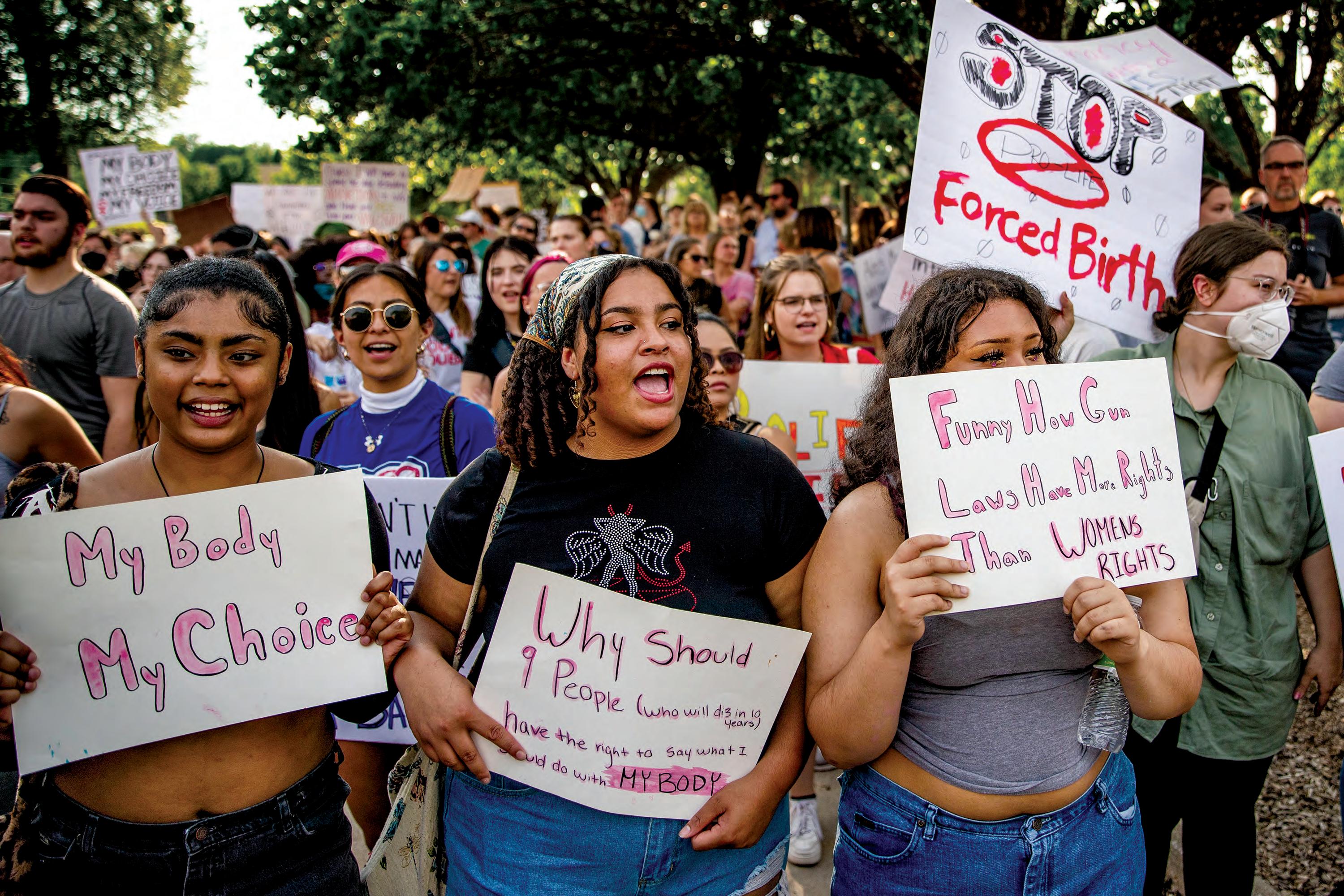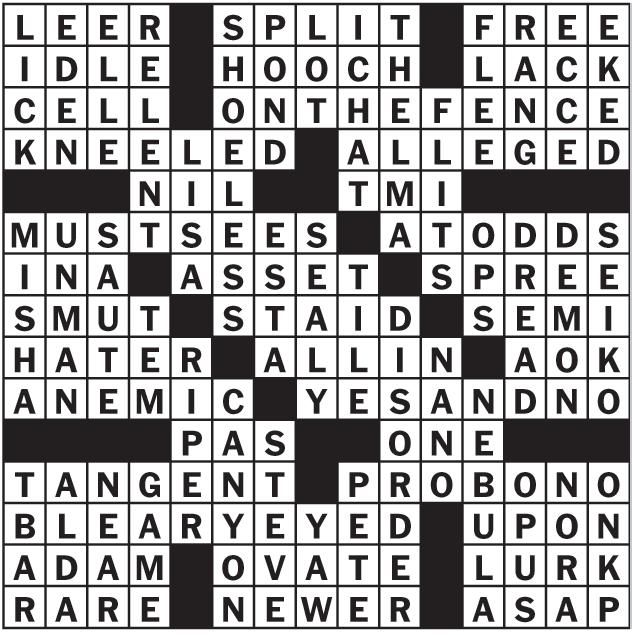One year post-Roe, Iowa fluctuates on abortion
Abortion rights in Iowa remain up in the air with back-and-forth legislation one year after the overturn of Roe v. Wade.

The Daily Iowan STAFF
Publisher | 335-5788
Jason Brummond
Summer Editors | 335-6030
Parker Jones, Alejandro Rojas
News Editor
Ellie Heeren
Visuals Editor

Cody Blissett
Arts Editor
Avi Lapchick
Opinions Editor
Evan Weidl
Sports Editor
Kenna Roering
Design Editor
Marandah Mangra-Dutcher
Digital Editor

Maddie Willis
BUSINESS STAFF
Business Manager | 335-5786

Debra Plath
Advertising Director/ Circulation Manager | 335-5784
Juli Krause
Production Manager
Heidi Owen
Front Photo: Protesters chant duaring an abortion rights protest in Des Moines following the U.S. Supreme Court’s decision to overturn Roe V. Wade on Friday, June 24, 2022. Protesters marched from Central Academy’s campus to Gov. Kim Reynolds’ mansion on Terrace Hill.
Grace Smith/The Daily Iowan
Edited by Will Shortz No. 0614
1 Not
BREAKING NEWS
Phone: (319) 335-6030 | Email: daily-iowan@uiowa.edu
CORRECTIONS
Call: 335-6030

Policy: The Daily Iowan strives for accuracy and fairness in the reporting of news. If a report is wrong or misleading, a request for a correction or a clarification may be made.
PUBLISHING INFO
The Daily Iowan (USPS 143.360) is published by Student Publications Inc., E131 Adler Journalism Building, Iowa City, Iowa 52242-2004. Periodiof March 2, 1879.
1 Taste, as a lollipop
2 Jack London’s “Martin ___”
3 Major fashion magazine
4 Insist no more
5 Barefoot, say
6 Setting for “Make Way for Ducklings”
7 National airline of Poland
8 Bygone Apple messaging app
9 Louise’s partner of film
10 Get out of Dodge, say
11 Reverberated
Iowa abortion rights one year later
One year after the overturning of Roe v. Wade, Iowa’s stance on abortion fluctuates. Staff
The nation’s wave of abortion bans started with the Supreme Court ruling which overturned Roe v. Wade on June 24, 2022. In the year since the Roe decision, Iowa City has felt the gravity of the Supreme Court decision in the changes the state has faced.
On July 14, 2023, the Iowa legislature banned abortion at the six-week mark. On July 17, a Polk County judge placed an injunction on the new law.
When the U.S. Supreme Court overturned the landmark abortion case Roe v. Wade, the nonprofit organization Planned Parenthood saw a nearly 100 percent increase in patients traveling from outside the Midwest to get an abortion in Minnesota, Iowa, or Nebraska. The organization has seen an increase in patients coming from states like Texas, Louisiana, and Missouri.

This is due in part to many states outright banning abortion with no exceptions, including for cases of rape or incest. According to The New York Times, 14 states have passed laws that completely ban any abortion, while another five have banned it only after 12 weeks of pregnancy.
Ruth Richardson, the president and CEO of Planned Parenthood North Central States, spoke at a conference on June 15 that abortion access has been decimated since Roe was overturned over a year ago.
“Today, people are hurting, they need help, and we are doing everything we can. We know that abortion bans do not ban abortions for everyone, just those without the means and opportunity to travel, creating
more barriers for people with low incomes,” Richardson said in the conference. “These bans also serve to increase the persistent and unacceptable maternal health disparities that we see states with the most restrictive abortion laws have the worst maternal health outcomes.”
Planned Parenthood has seen an increase in abortion patients that have to drive long distanc-
es to their appointments. Some patients must travel farther for abortion care because many cannot access care in their own states after recent legislation. Some states have protected abortion rights, while others work to dismantle those rights.
“While our neighbors and other states around the country decimate abortion access reproductive rights trans rights and access
to gender-affirming health care, Minnesota has protected rights by expanding abortion access by investing in sexual and reproductive healthcare,” Richardson said. “We know people are coming here for this care to exercise their right to control their bodies, their health, and their futures.”
Richardson stated that Planned Parenthood has staff dedicated to patient navigators who work every
day to help patients get to their abortion appointments. These staff members are lifelines to patients who often feel “scared and hopeless,” Richardson said, and have helped over 1,600 patients get to their abortion appointments since June.
“Increasing maternal mortality rates continue to climb, pregnancy
LAW
Continued from 3
is becoming more and more dangerous in America, and inequities are growing too,” Richardson said. “As we approach the one-year anniversary of Roe being overturned, I want everyone to know that Planned Parenthood is doing everything

we can to ensure that we can help as many people as we can.”
Doctor Sarah Traxler, the chief medical officer of Planned Parenthood North Central States, also spoke at the conference in June and said that since Roe v. Wade was overturned, she has seen the environment in health centers become very heavy and emotional.
“In Minnesota, we are a haven so it feels really stressful because we’re trying to work to see as many patients as we possibly
can, but there are only so many hours in the day to see all of the patients,” Traxler said. “Our wait lists for certain procedures are
longer and our staff are really feeling the urgency to get people in. And because we know with a heavy heart that if we can’t see them in Minnesota, there’s a possibility that they’re not going to be seen anywhere, and we don’t know what might happen to them.”
Our wait lists for certain procedures are longer and our staff are really feeling the urgency to get people in.
— Doctor Sarah Traxler, chief medical officer of Planned Parenthood North Central States
LAW
Continued from 4
Planned Parenthood health centers are still serving their communities while also providing care to patients from outside the region. Traxler said it has been beneficial to be a regional abortion provider aiding a large geographic region, and that she is happy to be able to provide care and support to patients and get them the resources that they potentially do not have access to in another state.

Traxler said that Planned Parenthood’s patients and staff have experienced an intense year. The impact she has seen from the overturning of Roe v. Wade has caused emotional, psychological, and financial stress for patients and staff alike.
She predicted there will be more clinical outcomes in the future and that it will impact maternal and infant morbidity and mortality, and affect minority populations.
“We are committed here at Planned Parenthood to continue doing everything we can. We are here for our patients, we will always be here for our patients, and I am determined and honored to do this work every single day,” Traxler said.
In contrast, pro-life groups on campus believe things are changing for the better in Iowa City.
In an email to The Daily Iowan, a group of members from the prolife student organization Young Americans for Freedom commented on the Supreme Court decision.
future lives and returning power to the states, was the right one,” the group wrote. “As conservatives, we believe every life has meaning and value –especially those of the unborn who depend on us to protect their very right to exist.”
tion on campus.
“Those of us who are pro-life have an opportunity to share our beliefs about the importance of protecting the lives of the unborn. The discussions aren’t always easy, but they are worth it,” the group wrote.
The organization was recently under spotlight for prompting campus-wide discussion around hosting outspoken conservative Matt Walsh for a screening of his documentary-style film “What Is a Woman?”
passed on Tuesday, July 11. The legislation came after the Iowa Supreme Court was deadlocked on June 16 regarding a previous abortion bill that had been stuck in an injunction. The bill, often known as the “fetal heartbeat” bill, would ban abor-
tie in June, it was permanently blocked.
On the same day, Iowa Gov. Kim Reynolds released a press statement highlighting her disappointment with the outcome.
“There is no fundamental right to abortion and any law restricting
“The Supreme Court’s decision to overturn Roe, saving countless
The group also encouraged conversation around the topic of abor-
Though the changes in the postRoe world have been felt by prochoice and pro-life groups alike, no change has been more noticeable than the abortion legislation
tions after a fetus’ heartbeat can be detected, or around six weeks of pregnancy. The bill was first passed by the state in 2018, but with the Iowa Supreme Court’s
it should be reviewed on a rational basis standard – a fact acknowledged today by three of the jus-
The Supreme Court’s decision to overturn Roe, saving countless future lives and returning power to the states, was the right one.
— Young Americans for Freedom
We are commited here at Planned Parenthood to continue dping everything we can. We are here for our patients, and I am determined and honored to do this work every single day.— Doctor Sarah Traxler, chief medical officer of Planned Parenthood North Central States
tices. Still, without an affirmative decision, there is no justice for the unborn,” Reynolds wrote.
Afterward, Reynolds announced she would call for a special session that would attempt to pass another abortion bill, with the session scheduled to be held on July 11. Accompanying the announcement of the special session was a statement from Reynolds, in which she called the pro-life movement “one of the most important human rights causes today.”

“Not only will I continue to fight against the inhumanity of abortion, but I will also remain committed to supporting women in planning for motherhood, promoting fatherhood and parenting, and continuing policies that encourage strong families,” Reynolds wrote.
On July 11, the Iowa House held its special session, where it voted 56-34 to pass House File 732, banning abortion when a heartbeat is detectable. During the session, members of the public were allowed to comment on the bill, being split into two groups: one for and one against. Public comments lasted an hour and a half.
Speaking for the side opposing the bill were many women who had undergone abortions themselves, and emphasized the need for and importance of having abortion access in the state. On the other side of the issue were more women who spoke about their belief that abortion should be banned, instead emphasizing the importance of raising families.
After the public comment period, the House went into a closed session to discuss and debate the bill. House members were given a deadline of 11 p.m. to finish their discussions, as they would be required to take a vote at that time if they had not already.
After the House passed the bill, Reynolds released a statement re-
garding its passing.
“Today, the Iowa legislature once again voted to protect life and end abortion at a heartbeat, with exceptions for rape, incest, and life of the mother,” Reynolds wrote. “The Iowa Supreme Court questioned whether this legislature would pass the same law they did in 2018, and today they have a clear answer. The voices of Iowans and their democratically elected representatives cannot be ignored any longer, and justice for the unborn should not be delayed.”
Reynolds signed the bill into Iowa law three days later on Friday, July 14.
At the Family Leader Summit in Des Moines the same day, where she signed the bill into law, Reynolds delivered remarks regarding its signing.
“We have a responsibility not only to protect the unborn in law but to change the destructive culture of abortion that still exists in a postRoe world,” Reynolds said. “Even with the fetal heartbeat bill, the fight continues for a robust culture of life that welcomes children, supports mothers, and involves fathers. As a pro-life governor, I will continue to promote policies designed to surround every person involved in a pregnancy with protection, love, and support.”
State Senator for District 45 Janice Weiner described House File 732 in an interview with the DI, and discussed the potential legal pitfalls written into the bill.
“The practical effect is to cut off about 98 percent of abortions in the state,” Weiner said.
The bill was a product of the special session that would usually grant a 90-day window between passage and enforcement, according to Weiner. However, a provision in House File 732 mandated that the bill be instituted immediately. This development could leave Iowa’s medical board scrambling in its wake.
“Those 90 days, regardless of what else I think about the bill,
would have given the board of medicine time to produce rules, so that doctors and hospitals and anybody else involved knows what they’re dealing with,” Weiner said.
Weiner also points to some of the confusion around the language within House File 732.
“We were told multiple times to look at the plain language of the bill,” Weiner said. “It is not clear. And very similar language has been used in a number of other states, and those are the same states where we are seeing horror story after horror story of women and girls not able to get care because the language is unclear.”
The unclear language surrounding exceptions is something that Weiner felt is particularly dangerous to Iowa constituents.
“Another challenge is, they claim there’s an exception for rape and incest. Nowhere in the Iowa code is rape defined,” Weiner said. “I forget what the term is: sexual violence or sexual assault, something. It’s not called rape. So, by
putting in these completely arbitrary time deadlines and requirements for reporting unfortunately guarantee that the exception is not an exception.”
The stipulations of the bill included exceptions for medical emergencies, rape reported within 45 days of the incident, and incest reported within 145 days of the incident. The bill also contains a clause prohibiting imposing “civil or criminal liability on a woman upon whom an abortion is performed in violation of this section.”
When asked about how this clause will be protected, Weiner said that Senate Democrats attempted to gain clarification multiple times on the floor.
“The best we got is that they don’t intend to do anything to the women,” Weiner said.
She also spoke of Iowa constituents and their beliefs on the topic.
“We’ve seen it in the polling here in Iowa, which I believe on this issue is pretty accurate because
we’ve seen it over and over again, but a substantial majority of Iowa supports keeping abortion legal and safe,” Weiner said. “One of the questions I keep asking myself is, ‘Why is it okay to ignore constituents, to ignore the voters?’”
Then on Monday, July 17, only three days after it was passed, a Polk County judge placed an injunction on the new abortion law. The ruling comes as a court challenge over the legality of the law plays out. As a result, abortion up to 20 weeks has become legal in Iowa once again.
Reynolds reacted to the ruling in a statement released after the judge’s decision.
“The abortion industry’s attempt to thwart the will of Iowans and the voices of their elected representatives continues today, but I will fight this all the way to the Iowa Supreme Court where we expect a decision that will finally provide justice for the unborn,” Reynolds stated.
daily-iowan@uiowa.edu
Post affirmative action, the U.S. needs to fund K-12 equally
Lower-income school districts are underfunded, leaving a major barrier to entering college.
on is the clear gap in public education funding that creates the voids necessary for patch job programs, programs that only fix the effect of other problems and don’t address the root of the problem, like affirmative action.
Affirmative action in college admissions has been struck down by the U.S. Supreme Court, leaving many questions about the future of college admissions and racial equity.
Some keep advocating for a return of affirmative action, and while affirmative action had notable benefits, it is not the best option in the long run.
What we should focus
In a world of underfunded schools, affirmative action is a good temporary solution. However, we should strive to make an admissions process that is solely based on merit, and to do that, we first need to adequately fund public schools.
The U.S. Supreme Court was correct in its decision to remove affirmative action. College admissions
should be based on merit and no other aspect. However, it was removed far too soon, as there are plenty of problems that need to be fixed before we are at a point where admissions can be based fully on merit. We still need to remove those unfair obstacles and barriers that limit anyone from utilizing their skills and dedication to the fullest. While underfunded school districts are the best place to start, there are many other problems that need to be looked into to ensure everyone can attain the same level of merit as they wanted to. A first step could be funding the underfunded
public schools, to ensure that all public schools receive the necessary funding, not only high-income districts. We need to ensure that there is nothing stopping kids from getting a quality education in public schools to ensure a bright future and stable career, whether they choose to go to college or not.
According to The Century Foundation, the U.S. is about $150 billion short on giving proper funding to its school districts.
Additionally, districts with higher rates of poverty have been 2.6 times more likely to be underfunded, and are more than
$6,700

short per student.
One of the reasons we had affirmative action in college admissions is because we also see a major link between low-income school districts and majority Black and majority Latino school districts.
It was also found that districts with more than 50 percent Black or Latino students were twice as likely to be underfunded. 86 percent of students in majority Black districts were in districts with funding gaps.
Using the interactive map that The Century Foundation created to show each district’s funding gap, there is a clear
reflection of what districts were getting hit the hardest by this divide, the most visible on the map being major cities.
Iowa is no stranger to this problem: A key district in Iowa, the Des Moines Independent Community School District, lacks almost $165 million in funding. That breaks down to about $4,500 per student.
Across the nation, we need to finally fund public schools properly in the name of equity for students. We should not limit or let others be limited in their education or educational aspirations.
luke-krchak@uiowa.edu
The UI should re-establish its prison education program
ed to be a pilot program in which volunteer educators from the UI guided one evening-long course to a select group of men currently being held in the correctional facility.
Incarcerate, educate, and integrate. These are the words the University of Iowa used to describe the 2017 UI Speaker Series at the Medical Classification Center Correctional Facility in Oakdale, Iowa.
The 2017 UI Speaker Series was initially creat-
Education is an invaluable tool for the rehabilitation and reintegration of incarcerated people, and every university should offer prison education as part of its curriculum. Unfortunately, this is not always the case.
Previously, the UI offered a course dedicated
to educating incarcerated individuals, but it is no longer possible to participate in the program today. The UI must renew its prison education program to benefit those who are imprisoned by the state of Iowa.
Kathrina Litchfield, a graduate student in the College of Education, initially envisioned the project after her time volunteering at the prison in 2011.
According to Litchfield, the early goal of her pris-
on education program was to “expand the [original] Speaker Series so that students [could] earn college credit [and] focus on the current situation in Iowa regarding education, incarceration, and reentry.”

Like many prisons and holding facilities, Oakdale offers no opportunity for higher education to inmates and disproportionately houses people of color from low socioeconomic backgrounds, which actively predisposes them to failure at reintegration
because of hiring discrimination and the lack of proper opportunity to make a living.
According to a recent survey performed by the U.S. Department of Justice, correctional education administrators reported that perceived major barriers in correctional education to be staff shortages, inadequate funding, the education department’s lack of power within the institution, and lack of adequate space.
One of the simplest methods for ending mass incarceration in the U.S. is to provide an equal opportunity for higher education and to raise the chance of future employment and lower re-entry into the system.
Reinstating a new prison educational program could be the way for the university to reconnect with the often-forgotten members of the state prison just 12 miles away.
jordan-coates@uiowa.edu
The University of Iowa no longer has a prison education system, but the benefits of the program are overlooked and very necessary.Jordan Coates Opinions Columnist COLUMN
Arts & Culture
Hancher announces new season lineup
Hancher Auditorium’s 2023-24 season to spotlight diverse performers and artist collaborations.
 Avi Lapchick Arts Editor
Avi Lapchick Arts Editor
Following the announcement of the Infinite Dream festival set to take place this fall, as well as the earlier report of a new Broadway subscription series, the University of Iowa’s Hancher Auditorium has released details on what to expect for its 2023-24 season.
The new season will begin on August 25 at 5 p.m. with
a free concert on the Hancher Green, headlined by the lead singer of the Alabama Shakes, Brittany Howard, and with performances from singer-songwriters Elizabeth Moen and Dawn Richard.
Singer and guitarist Jason Isbell will perform alongside The 400-Unit on Sept. 8, followed by legendary jazz pianist Herbie Hancock on Sept. 9, and eclectic folk musician Rhiannon Giddens

on Sept. 13.
Hancher will present artists both on and off the UI campus, and in spaces within its own facility.
“The goal is to present artists in spaces that serve them — and the audience — well,” Rob Cline, communications director for the Office of Performing Arts and Engagement, said in the press release.
Additional artists presented include the Elias
String Quartet, musician Josiah Wise — better known by his stage name serpentwithfeet — and tap dancer Ayodele Casel. These artists will perform at Hancher’s Stauss Hall, The Englert Theatre, and Hancher’s Hadley Stage respectively.
One of the season highlights will be a performance of the Cincinnati Opera’s “Fierce,” produced by the UI School of Music in tandem with Hancher and the
Performing Arts Production Unit, and composed by William Menefield, an assistant professor of jazz studies at the UI.
Hancher will collaborate with two festivals, the Mic Check Poetry Fest and the Feed Me Weird Things’ FEaST, as well as with Pulitzer Prize-winning composer Caroline Shaw. Hancher, in celebration of its centennial season, will deliver a performance from the UI
Department of Dance students in collaboration with the Martha Graham Dance Company. Collaborators will participate in educational engagements with the UI and broader Iowa City communities.
Tickets, as well as additional details, are available on Hancher’s website. Physical tickets can be purchased at the Hancher Box Office.
olivia-lapchick@uiowa.edu
Head-banging for a cause
The Illiterati Fest 2 featured a lineup of captivating musicians in support of the South District Market.
Avi Lapchick Arts EditorBehind a plume of cigarette smoke on the walk up to The James Theater’s Gilbert Street entrance was a portal to the pinnacle of the 1990s punk rock scene: welcome to Illiterati Festival 2.
The fest began at 8 p.m. on Saturday, July 15, with a performance from Lex Leto, a local music artist whose enchanting voice was accompanied by elements of jazz, pop, and electronica. They were followed by local punk-rock band Fishbait with a set list that brought the crowd from a trance-like state to an intense mosh.
Following the exciting contrast between the opening performances were local artists Mr. Softheart, a post-punk trio, Mary Bozaan and Avery Mo of Die Mad, and self-described “mistress of indie/ garage rockdom,” Penny Peach.
Anthony Worden and The Illiterati headlined the performance as the festival’s namesake and drew in a large crowd of people willing to freely express themselves through hardcore dancing. The band, consisting of Avery Moss, Capel Howorth, Elly Hofmaier, Aaron Knight and Carlo Kind, began playing
together around 2017, and has since performed alongside artists like Hippocampus and Neil Hagerty.
Their debut fest took place at Gabe’s last July and included aspects of both music and literature.
Anthony Worden, a University of Iowa alum, shared that the first Illiterati Fest was supposed to be his last due to him moving out of Iowa City, but he recently decided to move back.
“It’s a way to get all my friends together to play in a show, bring in the community, and support a local charity,” Worden said.
The band is dedicated to donating the entirety of its festival’s proceeds from ticket sales to local non-profits. Last year, they chose to support Inside Out Reentry Community, a program that helps facilitate the reintegration of formerly-incarcerated people into Johnson County.
This year, they are supporting the South District Market, an indoor market that serves Iowa City’s southside community year-round and provides an opportunity for local businesses to expand, including a pop-up diversity market this summer that takes place in the South District Market’s parking lot every week from 3 p.m. to 7 p.m., with the last

market set to take place on Tuesday, July 18.
“None of the bands are getting paid. We’re all doing it pro-bono for this charity,” Worden said. “We’re bringing people together to support a great cause and have a big party.”
As each artist rocked their respective sets, they were illuminated by projections that were colorful and quirky, handpicked by Pat O’Connor, the festival’s visuals director and a friend of Worden’s.
O’Connor’s unique approach included visual projection through live footage combined with old, wacky DVDs.
“I had all this stuff, and [Worden] just thought visuals would add to the show,” O’Connor said.
Even the space where O’Connor sat during the show was, in its own right, visually captivating: behind the thick of the crowd, a Persian rug that couldn’t have been larger than five by seven feet defined the
perimeter of O’Connor’s workspace.
In it, there was a bulky CRT display screen used to project VHS tapes and DVDs onto the walls, the floor, and the faces of the band while O’Connor crafted the visual arrangement, often layering old cartoons with clips from YouTube.
“If I’m ever doing something, I’m going to be decorating it,” O’Connor.
In addition to the auditory and visual aspects
of the show, local vendors Thick n’ Thrifted and Grimtooth’s Very Metal Things set up shop inside the theater, featuring multiple clothing racks of second-hand goods.
If you missed this year’s event, don’t fret: Worden said that the Illiterati Fest 2 was “just the jumping-off point,” and that he hopes to hold next year’s fest at an outdoor venue on Iowa City’s northside.
olivia-lapchick@uiowa.edu







Finding success through failure
After failing to make the Junior World Team in 2022, Arnold had to look inward. Now, he’s a Pan American Gold medalist at 79 kg.
many steps this year into becoming the best wrestler and best person I can be. I felt so much better about myself and the way I led up to the tournament. It was hard to really be down on myself when I knew that I did absolutely everything in my power that I could do to be a real champ this year.”
Arnold said he didn’t have time to dwell on the missed opportunity because he knew he had the Pan American Games in Chile to prepare for. So, he went right back to work, and it ended up paying off.
In Arnold’s first campaign competing for his home country, the Kennesaw, Georgia, native went 3-0 at the Pan Ams without allowing a point.
Arnold said he tried different cuisine and bonded with his teammates as they walked around the city.
Now that he’s back in the U.S., he has some downtime before spending his days in the practice room with head coach Tom Brands and the rest of his Hawkeye teammates, including fellow Iowa City High alum Ben Keuter.
Keuter ended his high school career, 111-0, and was Iowa’s 32nd four-time state wrestling champion. Keuter plans to wrestle and play football for the Hawkeyes.
Kenna Roering Sports EditorAfter failing to make the Junior World Team in 2022, incoming Iowa wrestler Gabe Arnold had to look inward.
He was falling out of love with the sport of wrestling and was physically and mentally drained.
Fast forward a year later, and he just took home a Pan American Gold medal at 79 kg while competing for Team USA in
Santiago, Chile.
“Just being able to put on the USA singlet and represent my country in the way that I did, it was just a super exciting dream,” Arnold told The Daily Iowan. “I just went out there and put on a show for all the Americans, and not just my own country, but every other country that was there as well, like Canada, Venezuela, Puerto Rico, Peru. It was just really surreal

being able to compete at such a high level and do what I do best.”.
This success, Arnold said, couldn’t have come without his failures and his faith in God, who he said called him to be a wrestler.
Arnold decided to move to Iowa City before his senior prep season and attend Iowa City High School. There, he went 41-0 and claimed a state title at 182 pounds.
Arnold felt that he found himself again, both on and off the mat.
But he hit another roadblock when he finished runner-up and was left off of the 2023 Junior World Team last month. But this time around, Arnold said he couldn’t be upset at himself for his performance.
“I didn’t reach my ultimate goal,” Arnold said. “I wasn’t a world champ this year, but I think I took so
He posted back-to-back 11-0 technical falls in his first two matches over wrestlers from Venezuela and Puerto Rico and defeated Canada’s Connor Church, 11-0, in the title bout.
Arnold said his time in Chile was even more special because of the different culture. He said the first few days in Chile were all business and he spent most of his time working out and keeping his weight down, but the team had a day after the tournament to spend exploring.
Arnold said he fell in love with the coaching staff when he visited Iowa and couldn’t imagine anyone else fighting for him in his corner. He also said he is ready to take on any role that the coaching staff seems fit and believes they have his best interest in mind.
Arnold is projected to wrestle at 174 pounds at Iowa. He isn’t sure if he is going to redshirt his freshman season, but he does know what he wants to make of his collegiate career.
“At the end of the day, “ Arnold said, “I know my goal is to be a four-time NCAA champ.”
mckenna-roering@uiowa.edu
Sports Beer Wars, an addition to the Cy-Hawk rivalry
Iowa and Iowa State have a fierce rivalry on and off the field; here’s how beer is fueling the archrivalry.
Brad Schultz Sports Reporter1894 was a significant year for sports in Iowa. It marked the beginning of the Cy-Hawk game, the annual football contest between Iowa and Iowa State that gives either team’s fanbase bragging rights for 365 days.
The rivalry was halted after 1934 because Iowa’s head football coach Ossie Solem did not return calls to reschedule it. The two teams did not play again until 1977 when a new trophy was introduced by then Iowa Gov. Robert Ray.
Since then, the series has been defined by low-scoring games and winning streaks. Games that have defined this rivalry’s tradition include: The 9-6 win vs Iowa State in 2012, the Hawkeyes winning 15 straight from 1983-1997, and the thrilling Iowa overtime win in 2017.
The two archrivals have since played every year, except 2020 because of the COVID-19 pandemic, with Iowa leading the all-time series, 46-23.
But in 2023, a new piece was introduced that has amped the rivalry up even more.
A New Era
For over a decade, college athletes have been fighting to make a profit off of their name.
This led to numerous conflicts and controversies, such as the discontinuation of the famous NCAA Football video game series, and the court case O’Bannon v. NCAA.
In 2021, this fight turned into a reality when the U.S. Supreme Court passed a law that paved the way for college athletes to be compensated, and the new era of Name, Image, Likeness was born.
New Collectives Introduced
In 2022, Brad Heinrichs founded the Swarm collective, which was designed to provide Iowa student-athletes with an opportunity to earn compensation and serve
their local communities.
Heinrichs is a 1997 graduate of the University of Iowa and currently serves as the CEO of Foster & Foster Consulting Actuaries, Inc., in Fort Myers, Florida.
The swarm has grown considerably, with 1,300 contributors within five months of the collective’s introduction.
The collective has helped the Hawkeye football team land Cade McNamara and Erick All, both highly sought-after transfers from Michigan.
Iowa and Iowa State realized that they needed to make something happen in order to compete with the bigger brand schools.
For years, the one thing that has brought Cyclone and Hawkeye fans together has been beer. It’s present at every Hawkeye and Cyclone tailgate, and it always seems to get a conversation growing.
However, with the fiasco surrounding Anheuser-Busch, Heinrichs saw an opportunity for the Swarm collective. Swarm partnered with Exile Brewing Company in Des Moines,
Beer in Milford, Iowa. Blum hopes that the beer will be available for purchase in time for this year’s annual RAGBRAI event.
Blum said the two sides are still trying to figure out a revenue agreement. He added that the collective will receive a few dollars per case, with hopes that it will be available in stores by the time football season rolls around.
Ames Lager will be the fourth beer to be sold as part of an NIL collective, joining Iowa, Boise State, and Cincinnati.
Social Media Reaction
Iowa and Iowa State fans have always fought on social media, especially during each edition of the Cy-Hawk series, making a case that their team is the best in the state.

With NIL taking over college athletics, the conversation has been dominated by the beer war brewing between the two collectives, with fans taste-testing the beers and campaigning for their school’s beer.
On July 11, Iowa State University announced its collaboration with Backpocket Brewing to launch Clone Fest, the first officially licensed craft beer of the Cyclones. All proceeds will go toward Iowa State athletics.
This has added more fuel to the fire, creating competition for Ames Lager. Fans have been weighing in the last week talking about the decision.
A War Begins
In Ames, Iowa, the We Will Collective was established in 2022 with a mission to help Iowa State athletes grow their character and give back to charities. The We Will Collective is led by executive director Brent Blum, a 2007 Iowa State graduate who currently works with the Cyclone Radio and TV Networks.
Throughout the year, the We Will Collective organizes special member events that include meet and greets with Iowa State players and coaches.
The Beer
With NIL beginning to take center stage,
Iowa, to create Swarm Golden Ale. Each sale of the new beer puts 20 percent of sales toward the collective. The Swarm netted over 30,000 in revenue in June, despite the beer not being available until the latter part of the month.
Heinrichs and Exile Brewing Company announced that the drink would be sold inside Kinnick Stadium this fall, thrilling the Hawkeye faithful.
With the early success of Swarm Golden Ale, the We Will Collective responded by introducing its own beer, Ames Lager.
Ames Lager will be manufactured by West O
The introduction of NIL has created a whirlwind of controversy and conversation amongst loyal college sports fans. NIL collectives continue to grow all over the country, with more fan events and special promotions for the most loyal donors.
With both Iowa and Iowa State collectives partnering with local breweries and creating their own beers, it’s no secret that the CyHawk rivalry is in a spot no one could have ever imagined.
For Hawkeye and Cyclone fans, the future of this historic rivalry will rest not only on wins and losses, but also on which collective can sell the most beer.
bradley-schultz@uiowa.edu
